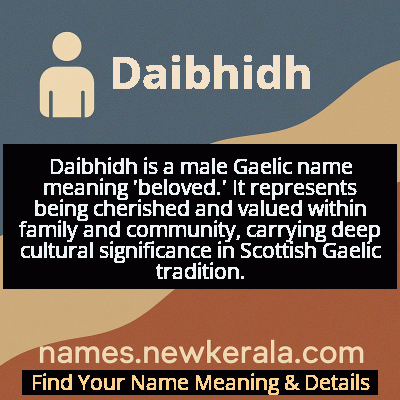Daibhidh Name Meaning & Details
Origin, Popularity, Numerology Analysis & Name Meaning of Daibhidh
Discover the origin, meaning, and cultural significance of the name DAIBHIDH. Delve into its historical roots and explore the lasting impact it has had on communities and traditions.
Name
Daibhidh
Gender
Male
Origin
Gaelic
Lucky Number
9
Meaning of the Name - Daibhidh
Daibhidh is a male Gaelic name meaning 'beloved.' It represents being cherished and valued within family and community, carrying deep cultural significance in Scottish Gaelic tradition.
Daibhidh - Complete Numerology Analysis
Your Numerology Number
Based on Pythagorean Numerology System
Ruling Planet
Mars
Positive Nature
Generous, passionate, energetic, and humanitarian.
Negative Traits
Impulsive, impatient, moody, and can be overly emotional.
Lucky Colours
Red, maroon, scarlet.
Lucky Days
Tuesday.
Lucky Stones
Red coral, garnet.
Harmony Numbers
1, 2, 3, 6.
Best Suited Professions
Military, sports, philanthropy, leadership roles.
What People Like About You
Courage, energy, leadership, generosity.
Famous People Named Daibhidh
Daibhidh MacGilleMhìcheil
Gaelic scholar and poet
Preserved important Gaelic manuscripts and composed traditional poetry
Daibhidh Stiùbhart
Jacobite commander
Fought in the Jacobite rising of 1745 and maintained Gaelic traditions
Daibhidh Mac a' Ghobhainn
Traditional musician
Master piper who preserved and taught traditional Gaelic music
Daibhidh Rothach
Gaelic educator
Founded Gaelic language schools in the Scottish Highlands
Name Variations & International Equivalents
Click on blue names to explore their detailed meanings. Gray names with will be available soon.
Cultural & Historical Significance
The name Daibhidh symbolizes cultural resilience and the survival of Gaelic language and customs against significant historical pressures. In the 18th and 19th centuries, during times of intense cultural suppression, Gaelic names like Daibhidh became markers of identity and resistance. Today, the name continues to represent a living connection to Scotland's Gaelic heritage, often chosen by families committed to language revitalization and cultural continuity. It serves as a reminder of the rich literary, musical, and historical traditions that have shaped Gaelic Scotland for centuries.
Extended Personality Analysis
Individuals named Daibhidh are typically perceived as possessing a unique blend of strength and sensitivity, reflecting the name's association with both leadership and artistic expression. They often demonstrate natural authority combined with emotional intelligence, making them effective leaders who understand and value the people they guide. This balance allows them to be both decisive in action and compassionate in relationships, earning respect through genuine connection rather than mere position or title.
Creativity and cultural appreciation are hallmark traits, with many Daibhidhs showing talent in music, writing, or other artistic pursuits. They tend to be deeply connected to their heritage and community, often serving as bridges between tradition and innovation. Their personality typically includes a strong sense of loyalty and responsibility, coupled with the wisdom to know when tradition should be preserved and when adaptation is necessary. This makes them valuable members of any community, capable of honoring the past while thoughtfully engaging with the present.
Modern Usage & Popularity
In contemporary usage, Daibhidh maintains its strongest presence within Gaelic-speaking communities in Scotland, particularly in the Western Isles and Highland regions where Gaelic language and culture remain most vibrant. The name has experienced a modest revival as part of the broader Gaelic renaissance movement, with increasing numbers of parents choosing Gaelic names for their children as a way of affirming cultural identity. While it doesn't rank among Scotland's most popular names overall, it holds significant cultural weight and appears regularly in Gaelic-medium education settings. The name's usage patterns reflect ongoing efforts to revitalize Scottish Gaelic, serving as both a personal identifier and a statement of cultural commitment. Among Scottish diaspora communities, particularly in Canada and the United States, Daibhidh is sometimes chosen to maintain connections to Scottish heritage, though often in its anglicized form 'David' for practical purposes.
Symbolic & Spiritual Meanings
Symbolically, Daibhidh represents the enduring power of cultural identity and the transmission of heritage across generations. The name embodies the concept of balanced leadership—merging the strength and authority of a ruler with the creativity and emotional depth of an artist, much like its biblical namesake who was both king and psalmist. It symbolizes cultural continuity and resilience, serving as a living connection to Gaelic history, language, and traditions that have survived centuries of challenge and change. The name also carries connotations of beloved community membership, suggesting that the individual is cherished within both their immediate family and the broader cultural family they represent. This symbolic richness makes Daibhidh particularly meaningful in contexts where cultural preservation, identity affirmation, and the balancing of tradition with modernity are valued principles.

